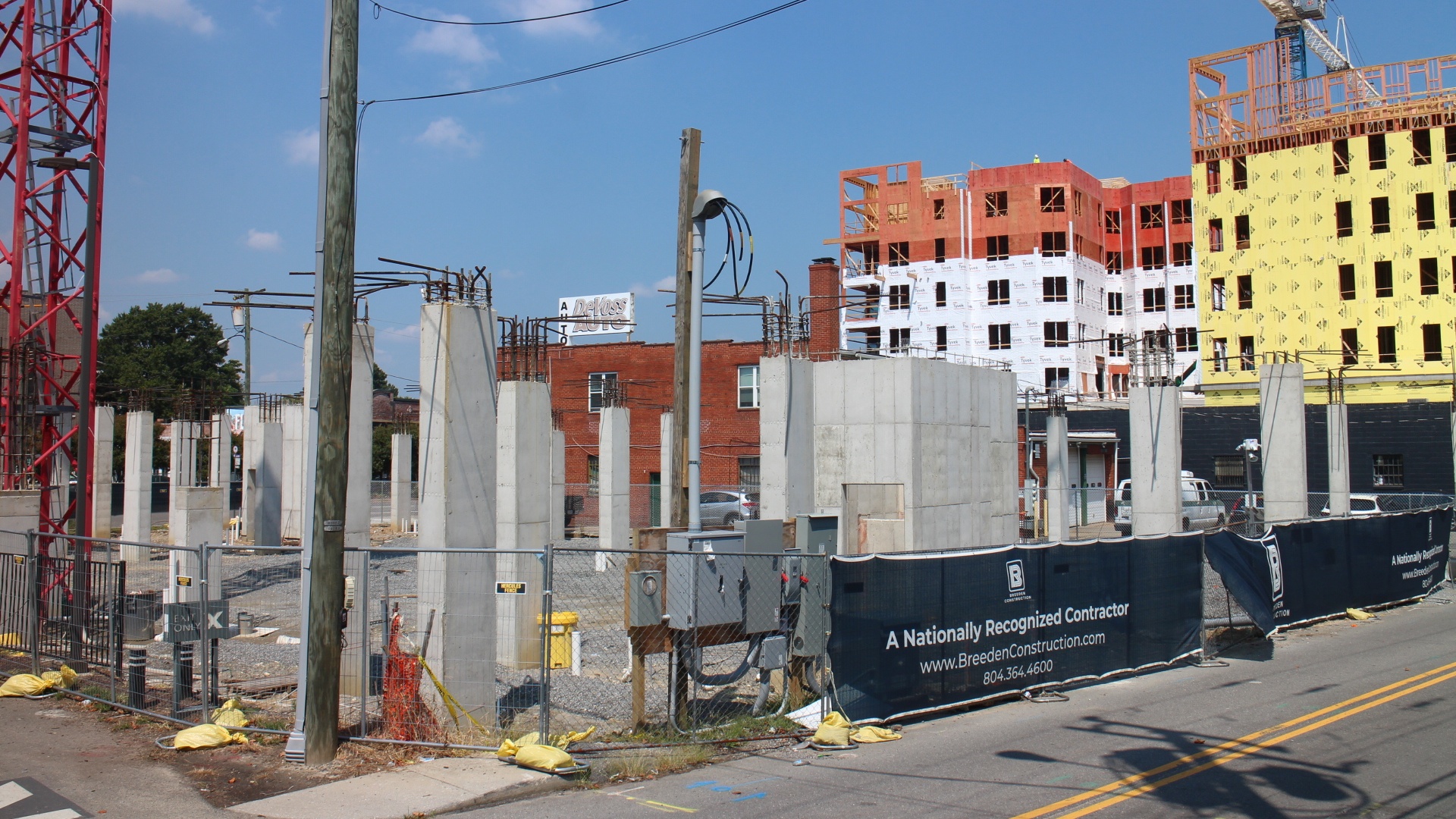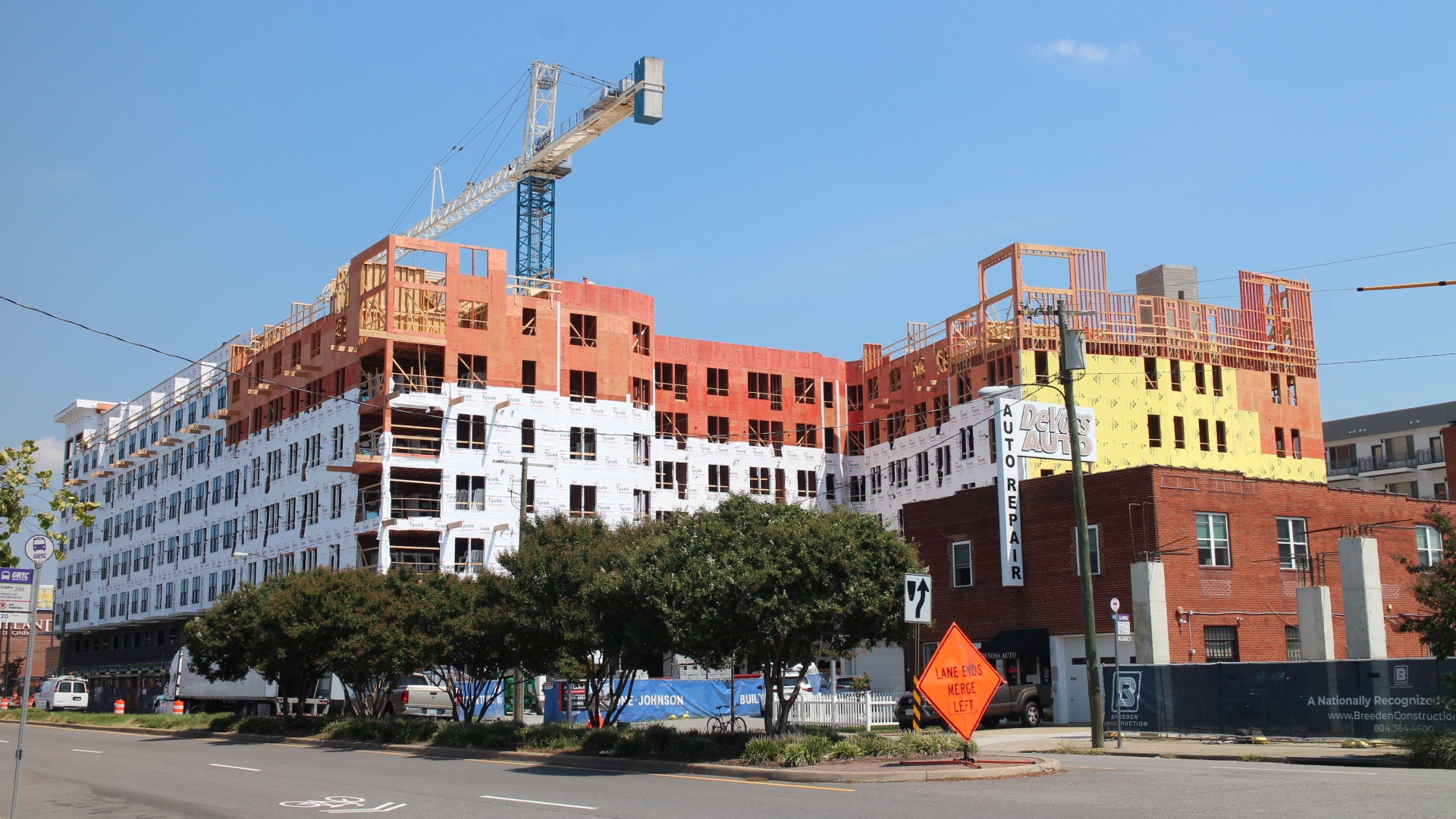
Work on the cohousing development stalled earlier this year. The nearby Ace mixed-use project, visible in the background, remains under construction. (Mike Platania photos)
Construction of a sizable development along Arthur Ashe Boulevard has apparently stalled, leaving concrete columns and rebar jutting out from the ground. It’s also left several contractors wondering if they’ll get paid.
In recent weeks a series of mechanic’s liens were filed against the property at 1101 N. Arthur Ashe Blvd., a 0.3-acre parcel where Washington, D.C.-based Outlier Realty Capital had started to build a six-story multifamily housing development.
The liens, filed primarily by Henrico-based general contractor Breeden Construction, seek around $2 million for “labor and materials for the construction of a multifamily…apartment building and associated improvements,” city court records show.
The filings started in late July, around the time that work on the development apparently ceased. A handful of roughly one-story-tall concrete columns currently stand on the site, as does a crane. But there’s been no noticeable activity at the property in recent weeks.
In addition to being Outlier’s entry into the Richmond area, the building would be the first “cohousing” development in the Scott’s Addition area, wherein tenants would have their own bedrooms and bathrooms but share living rooms, kitchens and common areas with other residents. Outlier’s development is planned to house 148 bedrooms across 29 apartments.
The status of the project and the reasons for it stalling are unclear. Outlier leadership did not respond to multiple calls seeking comment.
A spokesperson for Breeden declined to comment.
The development has been in the works since the summer of 2020, and site work began early this year. Outlier bought the land for $1.2 million in 2021, around six months after Richmond City Council approved the project.
A few subcontractors and suppliers also are claiming they’ve not been paid for their work on the development, including local electrician Tribble Electric and Georgia-based building material supplier White Cap Supply.
The dormancy at Outlier’s site stands in contrast to The Ace, a roughly $100 million development that recently topped out just to the north at 1117-1201 N. Arthur Ashe Blvd.
The Ace will reach eight stories and include nearly 300 apartments plus commercial space fronting Arthur Ashe Boulevard. Construction on The Ace began last fall and is scheduled to be completed in summer 2025, said a spokesperson for the project’s D.C.-based development team, Level 2 Development and SJG Properties.
Breeden Construction is owned by Virginia Beach-based The Breeden Co., a prominent development firm that has been sitting on plans for a project of its own not far from the Outlier site.
Breeden Co. in 2021 bought the former Cobb lumber site at 2300 Hermitage Road with plans to redevelop it into “Duplex Station on Hermitage,” a six-story mixed-use building that would include around 140 apartments and office space for Breeden Construction.
However, work on Duplex Station has yet to begin. Breeden’s spokesperson didn’t respond to a question regarding the status of that project.

Work on the cohousing development stalled earlier this year. The nearby Ace mixed-use project, visible in the background, remains under construction. (Mike Platania photos)
Construction of a sizable development along Arthur Ashe Boulevard has apparently stalled, leaving concrete columns and rebar jutting out from the ground. It’s also left several contractors wondering if they’ll get paid.
In recent weeks a series of mechanic’s liens were filed against the property at 1101 N. Arthur Ashe Blvd., a 0.3-acre parcel where Washington, D.C.-based Outlier Realty Capital had started to build a six-story multifamily housing development.
The liens, filed primarily by Henrico-based general contractor Breeden Construction, seek around $2 million for “labor and materials for the construction of a multifamily…apartment building and associated improvements,” city court records show.
The filings started in late July, around the time that work on the development apparently ceased. A handful of roughly one-story-tall concrete columns currently stand on the site, as does a crane. But there’s been no noticeable activity at the property in recent weeks.
In addition to being Outlier’s entry into the Richmond area, the building would be the first “cohousing” development in the Scott’s Addition area, wherein tenants would have their own bedrooms and bathrooms but share living rooms, kitchens and common areas with other residents. Outlier’s development is planned to house 148 bedrooms across 29 apartments.
The status of the project and the reasons for it stalling are unclear. Outlier leadership did not respond to multiple calls seeking comment.
A spokesperson for Breeden declined to comment.
The development has been in the works since the summer of 2020, and site work began early this year. Outlier bought the land for $1.2 million in 2021, around six months after Richmond City Council approved the project.
A few subcontractors and suppliers also are claiming they’ve not been paid for their work on the development, including local electrician Tribble Electric and Georgia-based building material supplier White Cap Supply.
The dormancy at Outlier’s site stands in contrast to The Ace, a roughly $100 million development that recently topped out just to the north at 1117-1201 N. Arthur Ashe Blvd.
The Ace will reach eight stories and include nearly 300 apartments plus commercial space fronting Arthur Ashe Boulevard. Construction on The Ace began last fall and is scheduled to be completed in summer 2025, said a spokesperson for the project’s D.C.-based development team, Level 2 Development and SJG Properties.
Breeden Construction is owned by Virginia Beach-based The Breeden Co., a prominent development firm that has been sitting on plans for a project of its own not far from the Outlier site.
Breeden Co. in 2021 bought the former Cobb lumber site at 2300 Hermitage Road with plans to redevelop it into “Duplex Station on Hermitage,” a six-story mixed-use building that would include around 140 apartments and office space for Breeden Construction.
However, work on Duplex Station has yet to begin. Breeden’s spokesperson didn’t respond to a question regarding the status of that project.




Dorm rooms for adults. Terrible idea.
What are your ideas for affordable housing?
Location.
Using muni bond corporate welfare for stadiums may be a start
Frankly, better leadership in American Education.
Not if $800 a month is all you can afford.
$800 a month for a bed and bathroom. This is how you get a society’s youth to accept impossibly diminished standards of living. To accept the greatest separation of wealth between the very top, the very bottom, and the PPP loan thieves in between. It is all our young will know. It is beyond insidious how this idea has crept into our acceptable ideas of living arrangements. The only difference between a prison cell is one is denied the commiseration of a cell mate
When I first moved here in the early 80s I lived in a house with 3 others, sharing one bathroom and one kitchen. This was fairly typical in the fan and Oregon hill at the time. With cohousing you get your own bathroom. I see this as a comparitive step up for a 22 year old. If I were 22 today and new in town I’d jump at the opportunity.
Yes. Being able to have one’s own space, no matter how small, is a luxury that many, many people in this world do not enjoy. One need only go to NoVA where immigrants have been sleeping in “hot beds” in shifts for decades before this recent housing pinch, and in Chinatown they often sleep in hamocks and bunks, like in the navy, all to be close enough to a job, any job.
Well written, but a little deluded sometimes — I’ve known a few people who had to be in jail — the worst part is not the cell, it is the fact that you have to be in the cell — worse, you don’t pick the cellmate and both the people I have known (one was a DORMMATE Deadhead of mine) would MUCH rather have had their own jail cell and no “mate” What IS true is that we have a situation where the rent and first time homes are too high in cost, which is causing all sorts of distortions… Read more »
Doesn’t strike me as that bad. I wouldn’t want to live in it now, but when I was 22 I might have. People should be allowed to make their own choices, even if it’s ones we ourselves would not.
I wonder if their financing fell apart. And whether Breeden will end up taking over.
You know Richmond already has other “dorm rooms for adults” style’s apartments (The James, 8 1/2 Canal, etc.) that are popular, right? These apartments work well for students and for anyone who is new to Richmond. I know multiple people who have lived in them a year after undergrad and coliving helped them meet people.
I spent some of my early 20s hitchhiking around Europe. Sometimes I slept in youth hostels, sometimes in the bush or in parks. Once, when I was in Prague one Summer, I slept in a “Youth Hostel” that was actually a communist era dormatory used by Charles University, right across from the enormous old Stadium. The dorms were unlike any I had ever seen, even old ones from the 19th century — my room was both luxury, in that it was designed for one, but also spartan, designed to fit only a sub-twin bed, a small dresser and a nightstand… Read more »
Well said, Shawn. Great story as well.
This does not fit the traditional developments called cohousing (per https://www.cohousing.org/). There are several that have been highly successful. Hoping that this does not give people a bad impression of how a well planned cohousing project can operate.
I’ve been involved in one way or other with a few co-housing projects. True, all were owner-occupied, but this project doesn’t really sound like a true co-housing project, where there was a principle of shared space and more community space within the project, not just the unit. Sounds more like the student-oriented “suites” that have popped up all over, and a few in Richmond near VCU. 901 Porter in Manchester is a really nice example of the co-housing model here. Info. can be found here co-housing generally and the project specifically: https://richmondcohousing.com/. Would be a great way to add more… Read more »
Thanks, Mark. This is really good information.
Decades ago, “rooming houses” were a standard type of housing unit. As they morphed into “single room occupancy” (SRO) hotels that became crack dens in the 80s and 90s, cities outlawed them. The loss of this first-level type of housing has led directly to America’s homeless crisis. Co-housing is a giant step in the right direction for solving housing affordability/homelessness problems.
But you still have the crack, no?